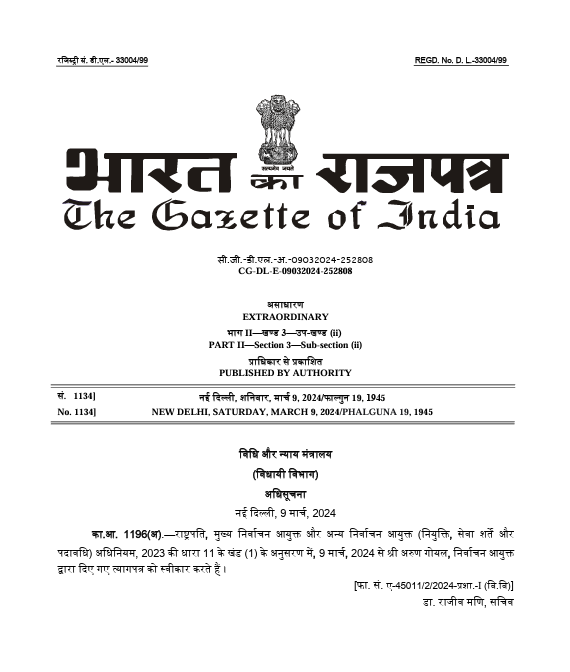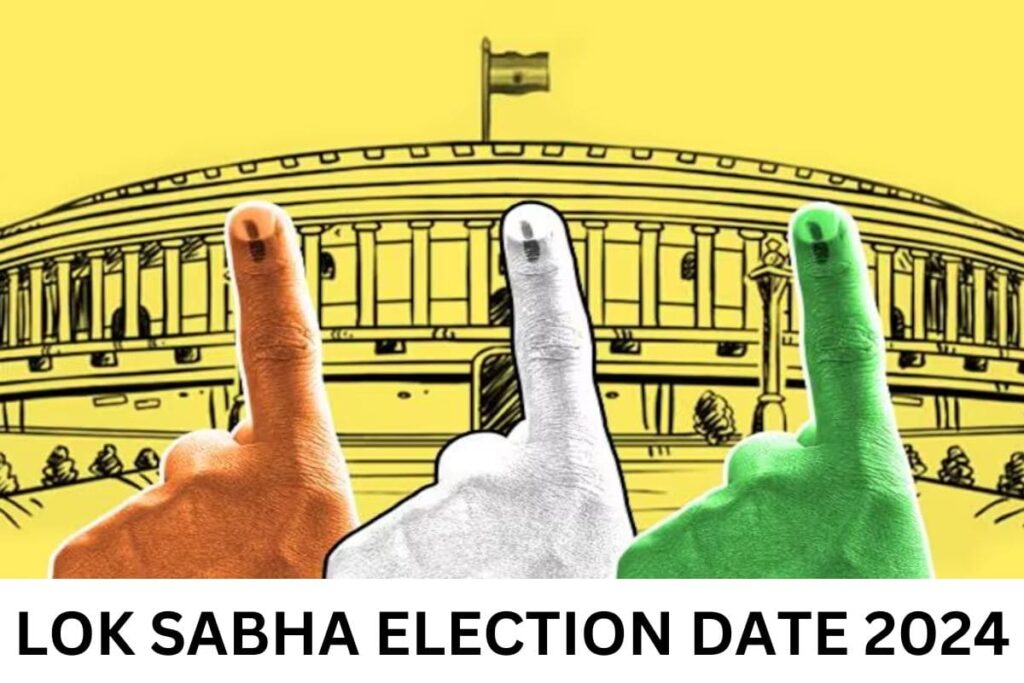Arun Goel, a 1985-batch Indian Administrative Service (IAS) officer of the Punjab cadre, tendered his resignation as Election Commissioner on March 9.
Goel had assumed this critical constitutional position on November 21, 2022, with his tenure originally set to continue until December 2027.
However, his abrupt decision to step down barely 16 months into the role has sent shockwaves across the nation and raised grave concerns about the integrity of the upcoming general elections.

Arun Goel’s Controversial Appointment and Career
While the specific reasons behind Goel’s resignation remain unclear, with officials only citing “personal reasons,” his appointment itself had been mired in controversy.
Goel had voluntarily retired from the IAS on November 18, 2022, while serving as the Secretary in the Ministry of Heavy Industries.
In a move that raised eyebrows, he was appointed as an Election Commissioner just three days later on November 21st.
Goel’s career as a bureaucrat had been marked by significant achievements. During his tenure as the Heavy Industries Secretary, he played a pivotal role in driving India’s Electric Vehicle (EV) movement forward.
Additionally, he had overseen the management, disinvestment, restructuring, and potential revival of 41 Central Public Sector Enterprises (CPSEs) across the country.
His experience in conducting Parliamentary and Assembly elections smoothly as a District Election Officer in Punjab’s Ludhiana and Bathinda districts was seen as a valuable asset for the Election Commission.
Implications and Concerns
Arun Goel’s sudden resignation has left the Election Commission of India (ECI) in a precarious position, with only Chief Election Commissioner Rajiv Kumar remaining active.
The recent retirement of Anup Chandra Pandey in February had already created a void within the commission, which is entrusted with the task of overseeing free and fair elections in the world’s largest democracy.
The timing of Goel’s departure, just days before the announcement of the Lok Sabha election schedule, has raised alarm bells across the political spectrum.

With the Lok Sabha polls likely to be held in April-May, the government will now have to swiftly initiate the process of appointing new election commissioners to fill the vacancy left by Goel’s exit.
Opposition parties have expressed grave concerns over the lack of transparency surrounding Goel’s resignation and the potential impact it could have on the independence and impartiality of the ECI.
Congress leader K.C. Venugopal highlighted the opaque manner in which this critical constitutional institution has been functioning, raising questions about the government’s influence over it.
“This resignation has once again raised concerns about the independence of democratic institutions like the Election Commission,” Venugopal stated. “It is deeply concerning that such a crucial resignation has happened just before the Lok Sabha elections, without any transparency or accountability.”
Significance of the Election Commission
The Election Commission of India (ECI) plays a pivotal role in safeguarding the democratic functioning of the nation.
Established under Article 324 of the Indian Constitution, the ECI has the power of “superintendence, direction, and control” over all elections to Parliament, state legislatures, the office of the President, and the office of the Vice-President.

Since India’s independence in 1947, the ECI has been the custodian of free and fair elections, ensuring the smooth conduct of national and state-level electoral processes.
The commission’s independence and impartiality are crucial in maintaining the integrity of the electoral system and upholding the principles of democracy.
Any perceived compromise or interference in its functioning could have far-reaching consequences for the credibility of the elections and the acceptance of their results by all stakeholders.
Legal Basis and Process for Resignation
Arun Goel’s resignation as Election Commissioner finds its legal basis in Section 11 of The Chief Election Commissioner and other Election Commissioners (Appointment, Conditions of Service and Term of Office) Act, 2023.
This act grants both the Chief Election Commissioner and Election Commissioners the right to resign by submitting a written notice to the President of India.
The process of appointing new Election Commissioners has also undergone significant changes. Late last year, the Centre enacted a law that excluded the Chief Justice of India from the appointment process.
Now, the President appoints the top poll officers based on the recommendations of a panel comprising the Prime Minister, the Leader of Opposition in the Lok Sabha, and a Union Cabinet Minister nominated by the Prime Minister.
This new procedure has further fueled concerns about potential political interference and the erosion of the ECI’s autonomy. Critics argue that the exclusion of the Chief Justice of India, who was previously part of the appointment process, could undermine the commission’s independence and impartiality.
Also Read: Elvish Yadav, Bigg Boss Star Accused of Brutal Assault on Fellow YouTuber on March 8












Comments 1